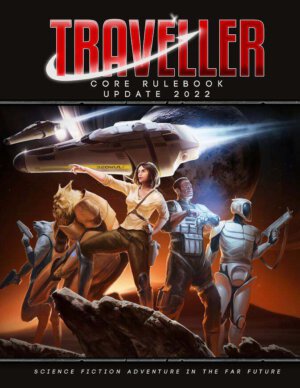
Publisher: Mongoose Publishing
Authors and Designers: Marc Miller (Classic Traveller), Matthew Sprange (Mongoose Traveller Developer), and Gareth Hanrahan (Original Core Mechanics)
Artists: Katrina Hepburn and Sandrine Thirache (Layout), Xavier Bernard, Sergio Villa, Anderson Maia, Mark Graham, Nikita Vasylchuk, Douglas Deri, Ian Stead, Ankit Yadav, Cassie Gregory, Alessandro Rocco, and Colin Dunn
Year: 2022
Genre: Classic science fiction roleplaying game
Pages: 264
MSRP: $59.99 for the hardcover or $30.00 for the PDF at DriveThruRPG
In many ways, Traveller is to science fiction roleplaying what Dungeons & Dragons is to fantasy roleplaying. First published in 1977, Traveller has been through many editions and publishers in its long history, landing with UK publisher Mongoose Publishing in 2008. A second Mongoose edition came out in 2017, featuring greatly improved art and presentation as well as some revised rules mechanics. This “Update 2022” version keeps the 2nd Edition rules changes and adds some material that was notable absent from the previous corebook
notably ship creation rules. I should note that, while I have run and played the 1st edition of Mongoose Traveller, I had not engaged with the 2nd Edition of the game until reviewing this book.
The second iconic element of Traveller is the tech-y, relatively realistic presentation of standard sci-fi elements like ships, travel mechanics, planetary systems, and the like. While the universe does include Faster-Than-Light travel and artificial gravity, the technology is otherwise fairly grounded. Ships have a utilitarian feel to them, and unlike the original 2nd edition core book can be built from scratch (a process that, unlike some previous editions of Traveller, does not require advanced high school math to complete). Moreover, we see several pages worth of Traveller’s iconic 2d deck plans for ships that would be commonly flown by PC groups. There is also a lengthy personal gear and non-starship vehicles. It’s worth noting that Traveller has always avoided wading deep into the “transhumanist” side of sci-fi, and so while there is some cybernetics, there is very limited AI and little in the way of body modification or brain swapping (as compared to something like Eclipse Phase).
This leads into the third iconic element of Traveller–the default setting for Traveller, referred to as “Charted Space” or the “Third Imperium.” The setting is not described in detail in Update 2022 but does lurk in the background of the book. For example, there is a Noble career, pointing to the “space feudalism” of the Third Imperium setting. Unlike other popular presentations of “space feudalism” (Dune and Fading Suns come to mind), the Third Imperium is a federal system that is primarily concerned with controlling interstellar trade as opposed to directly ruling planets. As a result, combined with the fact that most Traveller games are set in the frontiers of the Imperium, the assumed tone of play has a strong “space Western” or “British Raj in space” feel. While there is an enormous amount of material out there for the Third Imperium, the setting is so big and so decentralized that there is plenty of
Gameplay-wise, Traveller uses a 2d6 mechanic—roll 2d6, add modifiers for attributes and skills, try to beat a target number (8 by default). Added for the 2nd edition of the game is a “boon and bane” system that is similar to Advantage and Disadvantage in 5e D&D—when circumstances are favorable, roll 3d6 and count the highest two dice; when circumstances are unfavorable roll 3d6 and count the lowest two dice. As with many sci-fi systems, skills are at the core of the system, with a large but not overwhelming skill list. Combat is quick and fairly deadly, with damage coming off of physical attributes. The game engine is simple, plays fast, and should not present too much of a learning curve for new players and GMs coming off of other game systems.
Finally, while the 1st edition of Mongoose Traveller made the dubious choice to go for a retro-1970s look in terms of art and lay-out, Update 2022 has a clean, modern lay-out, with full color art. The art is not at the level of the very top of the industry (i.e. Free League Publishing), but it is solid and pleasant. The book is well-organized, and the PDF I reviewed has bookmarks (although they have very few second level bookmarks, which is disappointing). It’s worth noting that Mongoose’s products in general, and 2nd edition Traveller materials in particular, are a bit on the pricey side for the length of the books and what you get. Still, the Update 2022 Corebook is a beautiful book, and a solid value.
There are a host excellent sci-fi rpgs settings and systems out there, but Traveller has stood the test of time. The Third Imperium setting is one of my favorite sci-fi settings, and this Update 2022 book has got me back into Mongoose’s Traveller line. Traveller is a classic, but it is a classic for a reason, and if you are looking for a grounded sci-fi game with lots of space for the GM and players to explore, it’s hard to go wrong with this product.
When he is not reading gaming materials, Mike lives in Columbus, Ohio with his fiancee and a rather large cat.Mike's day job is as an attorney, representing consumers and investors all over the United States.
1 Comment
Warning: Undefined array key "size" in /home/thegamin/domains/thegaminggang.com/public_html/wp-content/plugins/ghostpool-core/elementor/elements/inc/class-comments.php on line 62
Nice review. For old-school Travellers, does the Mongoose edition have advantages or shortcomings relative to the original “little black books”?